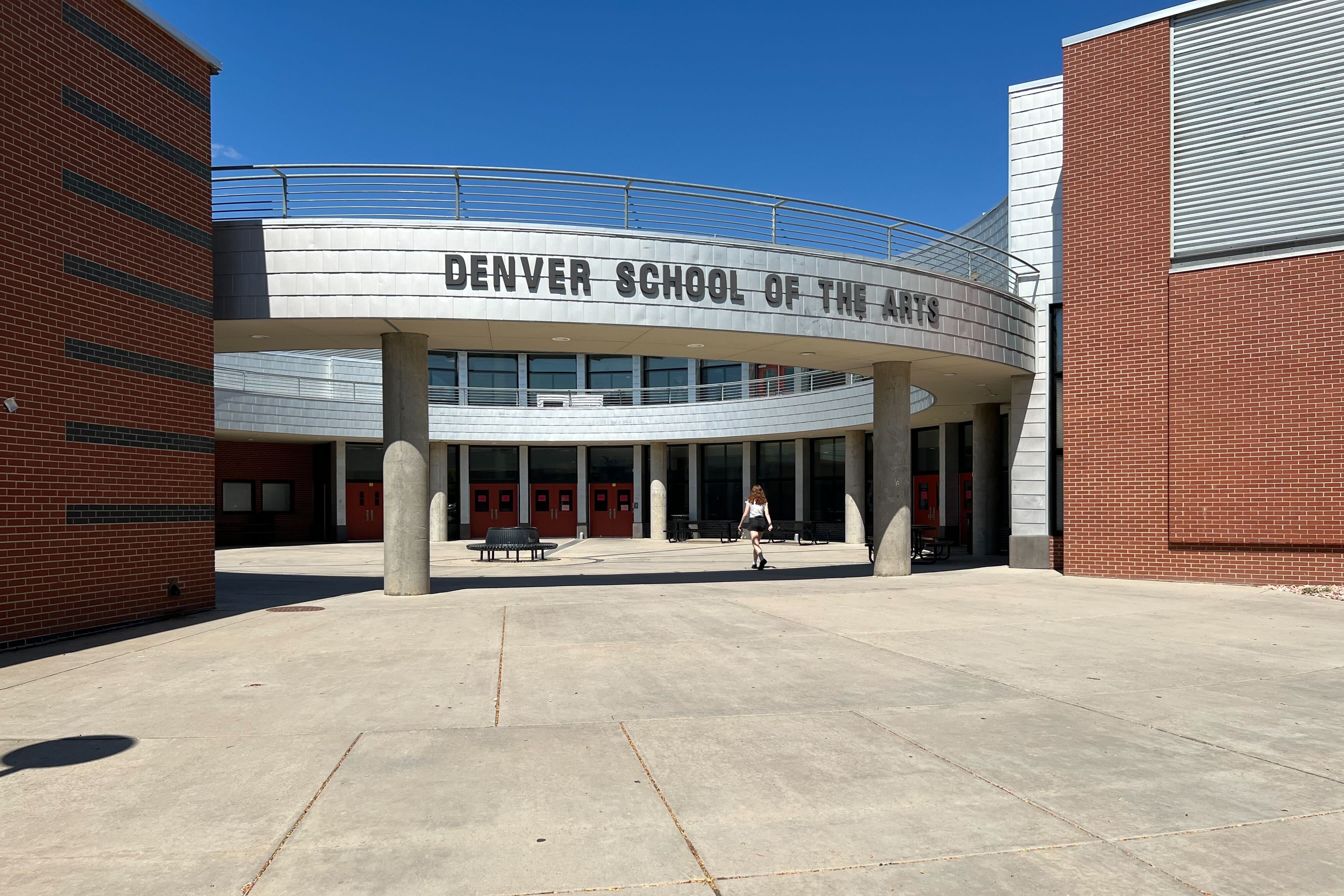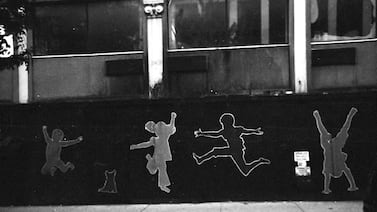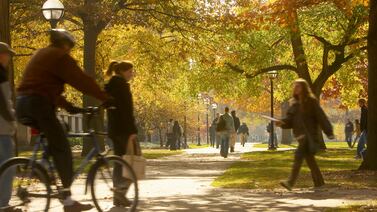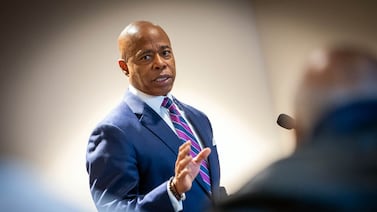Charlie Perlow and her mother remember meetings with Denver School of the Arts administrators where they would say Perlow “just needs to try harder.”
“That was super discouraging for someone who is trying their best,” Perlow said.
Perlow has attention deficit hyperactivity disorder and dyslexia, and though she graduated in 2020, the 20-year-old said she has not gone to college in part because her high school experience made her worry she’d do poorly there.
Families of other students with disabilities at the prestigious public school say Perlow’s experience fits a pattern: that Denver School of the Arts, which requires an audition to get in, is not welcoming or accommodating to students with disabilities.
The school also has experienced staff turnover in recent years, which resulted in students going several weeks without any special education teachers last spring. A family filed a federal complaint, and Denver Public Schools settled it without admitting fault.
In a statement, the district said the lapse, which occurred at a time when many schools were struggling with staffing shortages, is not indicative of a larger problem.
“Denver Public Schools is committed to ensuring that our schools are welcoming, inclusive environments that meet the needs of our students with disabilities,” the statement said.
“Denver School of the Arts, in particular, is committed to maintaining this inclusive, supportive approach within its rigorous arts-magnet program,” it said.
But some families said it doesn’t always feel that way. In all, Chalkbeat spoke with eight parents of students with disabilities who attend or attended Denver School of the Arts. Most didn’t want to go on the record for fear of retaliation against their children.
All said they felt pushback. Some said they felt pushed out.
When Perlow’s mother Jennifer would volunteer to give tours to prospective students and parents at Denver School of the Arts, many would ask her opinion. Jennifer Perlow said she’d tell them that if their child is creative and doesn’t have academic challenges, Denver School of the Arts is a great option. But if they do, “this isn’t going to be the place for you.”
“I always got the impression that most of the administration would much rather kids with challenges drop out than stay,” she said.
A lower percentage of students with disabilities
Denver School of the Arts is different from other public schools in Denver. Whereas other schools accept students based on a lottery, Denver School of the Arts requires an audition for one of its arts programs, which include dance, guitar, theater, and visual arts. The school turns away more than 500 students each year, according to a district presentation.
That’s a significant number given that the school, located in the Park Hill neighborhood, only has about 1,100 students in grades six through 12.
About 5% of the students at Denver School of the Arts qualify for special education, which is far below the district average of 12%. The school is also whiter and wealthier than most of the district, with few students learning English as a second language.
It also stands out for its ability to attract students from the suburbs and even out of state. Only about half of the students at the school live in Denver, the district has said.
Because the school is so in demand, the district wants to expand it. Last year, the school board approved spending $30 million to buy four buildings on an adjacent campus that was most recently home to Johnson & Wales University. The buildings, which the district estimates will cost up to $10 million to renovate, could hold as many as 800 more students.
Crucially, the expansion is meant to help diversify Denver School of the Arts by using a different audition process. District officials have said admission would be based less on the type of proficiency that comes with taking years of lessons and more on raw talent.
But if Denver School of the Arts expands to serve more students, the need for special education services is likely to increase. Sharon Malley, a retired special educator and artist who co-edited a book called “The Handbook of Arts Education and Special Education,” said it’s important for schools that offer intensive arts education to support students with disabilities.
“Students who are highly gifted in an art form but happen to have a disability by all means should be given the full support necessary so they can discover their life’s work or their life’s passion,” said Malley, who was previously the special education specialist for the John F. Kennedy Center for the Performing Arts. “You can have a rigorous academic program and also include students with accommodations and modifications.”
Some parents at Denver School of the Arts have felt they needed to hide their children’s learning challenges.
When Mary Chambers’ child got accepted to Denver School of the Arts, she said her family waited to tell the school that their child had an individualized education program, or IEP, that details the special education services they receive. The reason they waited was “because it’s so competitive and we were scared about the discrimination,” she said.
When they convened a meeting before the first day of school, Chambers said administrators told them the school couldn’t provide the reading services their child needed — a disclosure she said was “devastating.” The family decided to enroll anyway because their child loves to draw and had spent many hours practicing over the previous year to get in.
But Chambers said it has been difficult. School staff have removed services she sees as vital from her child’s IEP, she said, because “it was not going to fit their schedule.” The remaining services have been inconsistent because of staff turnover, she said.
“I do not feel welcome at that school. I feel like they do not want my kid there,” Chambers said. “It felt like that before they walked in the door when we had that first meeting.”
Teacher says parents can be difficult, too
Denver Public Schools declined to make anyone available for an interview for this story. In its statement, the district admitted the lapse in special education staffing at Denver School of the Arts last year. The lapse was caused by the midyear resignations of the school’s two special education teachers and only lasted three weeks, it said. (Families said it was longer.)
“In an environment where hiring special education teachers can be challenging, especially midyear, DSA’s quick hiring turnaround is reflective of their focus on fixing the situation and limiting the impact to students,” the statement said.
After a family filed a complaint with the federal Office for Civil Rights, the district opted for a voluntary resolution wherein it didn’t admit fault. As part of the resolution, the district promised to meet with each of the affected families by Nov. 1 to determine whether their children missed enough special education to qualify for makeup services.
To show the lapse was not part of a bigger problem, the district pointed to rulings in other complaints filed by Denver School of the Arts families that it said “generally” found the school did nothing wrong. In one such complaint filed with the Colorado Department of Education, a complaints officer found in February that most allegations were not true.
However, the complaints officer found that staff turnover resulted in a student not getting 32 hours of special education services the school had promised — although the officer noted that the student still got good grades and was not “educationally harmed.”
Rob Gould, president of the Denver Classroom Teachers Association and a former special education teacher, said special education has always been hard to staff. Additional responsibilities put upon special educators during the pandemic exacerbated those challenges.
“This is a widespread issue,” Gould said. “We hear it happen all over the city.”
But a former Denver School of the Arts special education teacher said the challenges at the school stem not only from an unsupportive system but from difficult parents as well.
Teacher Nicole Kitchen left the school after more than nine years because the demands of some parents became too much. In her last year, she said she spent most of her time responding to emails and meeting with a single dissatisfied family, which left her little time to help other students. Administrators avoided the situation rather than backing her up, she said.
“I left, and many of my colleagues left, because of the lack of administrative support in addressing the unrealistic expectations of families,” Kitchen said. “The squeaky wheels get the grease, and the wheels have just gotten squeakier.”
Family feels ‘pushed out for sure’
So where does that leave students who need extra help?
Hava Gordon said her family has decided to leave Denver School of the Arts after her son finishes middle school this year. Gordon’s story is similar to those told by other parents. When her son started to struggle in sixth grade, she asked the school about learning support.
She said administrators told her that her son “should be able to keep up.”
“The subtext was, ‘He must be the problem,’” Gordon said.
The school did not offer to evaluate her son for learning disabilities, Gordon said, so she paid to have him evaluated by a private provider. After she emailed the school the results, she said she didn’t hear back for six weeks. When she finally did hear back, it was to say that the attachment hadn’t come through. Her son didn’t get any services until the last month of school.
When he finally did get services, Gordon said it was “like the sun came out.” He started catching up in his classes and learning to advocate for himself with his teachers. But then his special education teacher quit. So did the teacher who was hired to replace her the following year. Her son’s confidence plummeted and he began struggling academically again.
Even though he’s made great friends and loves being surrounded by talented peers, Gordon said he has decided that Denver School of the Arts isn’t working for him.
“He’s recognizing and I’m recognizing that he needs to be in a place that has more special education support,” she said. “I feel like we’re being pushed out for sure.”
Melanie Asmar is a senior reporter for Chalkbeat Colorado, covering Denver Public Schools. Contact Melanie at masmar@chalkbeat.org.








